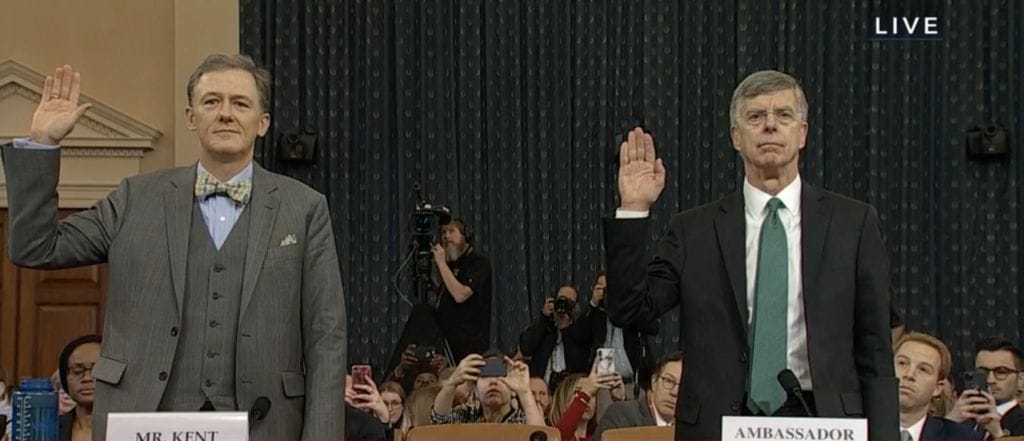
Wed. Nov. 13, Courtesy: CSPAN
The following is a new analysis
There are plenty of post mortems on day one of the impeachment hearings against President Trump.
There’s a summary in The Huffington Post, this left-sided take is from Rolling Stone, and here’s a view from the right-side in The Washington Examiner.
Instead of reinventing the wheel, I’ll highlight a few interesting sections from each of the two witnesses.
George Kent, Deputy Asst. Secretary of State testified that the Obama administration pressed Ukraine to investigate the Ukrainian energy company Burisma long before President Trump sought an investigation.
Kent agrees today that Burisma should be “fully investigated,” as President Trump has asked.
Kent explained the history of Burisma corruption. He alleged that Burisma CEO Mykola Zlochevsky, formerly part of the pro-Russian Ukrainian government (2010-2012), was guilty of self dealing and corruption. Zlochevsky then went on to found Burisma, the largest private gas company in that nation.
Kent stated that in December 2014, a bribe was paid within Ukraine to make an investigation into Zlochevsky’s crimes “go away.” Kent says the bribed official fled Ukraine as the U.S. pressed Ukrainian officials to answer why prosecutors closed the case.
Kent stated that about the time the bribe was paid to shut down the investigation of Burisma in 2014, the corrupt Zlochevsky invited a series of new, prominent individuals to serve on his board. They included the former president of Poland and the son of Vice President Biden, Hunter. Hunter Biden was reportedly paid upward of $50,000 a month to serve on Burisma’s board for the corrupt Zlochevsky.
Kent testified that he was so concerned about Burisma corruption, that in May of 2014, when he learned Burisma was trying to co-sponsor an essay contest with the U.S. Agency of International Development, Kent asked the U.S. to bow out, saying we should not co-sponsor anything with a company that has such a bad reputation.
Kent said that in 2015, he expressed concern about “Hunter Biden’s status as a [Burisma] board member” amid the corruption questions because it “could create the perception of a conflict of interest.” He said he did not raise the issue with the State Department, which did not seem concerned, but did raise it with the Vice President’s office. Kent stated he has “no idea” what the Vice President’s office did about his concerns.
In Spring of 2016, Vice President Joe Biden threatened to withhold U.S. military aid from Ukraine unless the Ukrainian president agreed to fire its chief prosecutor within six hours. The prosecutor was investigating corruption including Burisma, where Biden’s son still served on the board. Ukraine’s president agreed and fired the prosecutor. (Biden has said he got the prosecutor fired because he was corrupt.)
Kent defended Biden’s action and stated it was accordance with U.S. policy.
When asked, Kent agreed that it was unprecedented for a U.S. official to give a foreign president a six hour deadline to fire a prosecutor as a condition for receiving U.S. aid.
Kent says up until today, the U.S. has not gotten a satisfactory answer to why the Burisma case was closed.
Kent testified that Burisma corruption still needs to be investigated because U.S. tax money was involved, and he says he would like to find out the name of the corrupt Ukrainian prosecutor who took the bribe. Kent says he expressed this desire in 2015.
Kent says the new president of Ukraine and new prosecutor have agreed to review the old crimes never brought to justice, but that often people are “never held to account” in notoriously corrupt Ukraine so there is “lots to review.”
Kent stated that Vice President Biden made six visits to Ukraine, though Biden stated he’d been there 13 times.
When asked if someone, such as Biden should be immune from investigation because he is currently running for political office, Kent stated “no.”
When asked, Kent agreed it’s appropriate to look at foreign assistance in terms of levels of corruption within the receiving country.
Read the Politico investigation about Ukrainian interference in the U.S. 2016 election to help Hillary Clinton and “sabotage” Trump. https://www.politico.com/story/2017/01/ukraine-sabotage-trump-backfire-233446
William Taylor, Acting Ambassador to Ukraine said he found a “weird combination of confusing and ultimately alarming circumstances” involving the newly-elected government in Ukraine. He said there appeared to be two U.S. diplomatic channels for communicating with and about Ukraine: “regular” (which he had control over) and “irregular.”
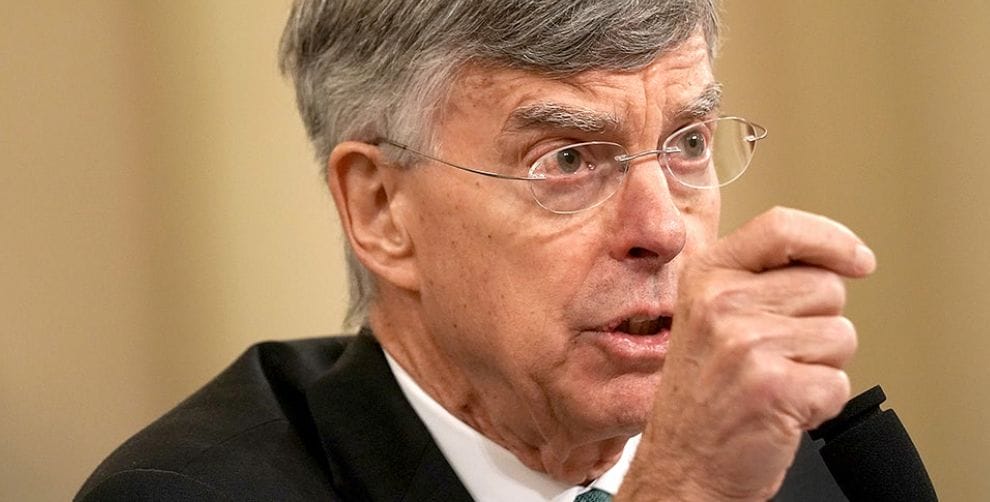
Amb. Taylor testified he was concerned that the “irregular channel was going against purpose of regular channel.”
Amb. Taylor indicated he was upset that President Trump was going outside the “regular” channels, using an “irregular, informal” channel “unaccountable to Congress” that consisted of:
- Energy Secretary Rick Perry
- U.S. Special Representative for Ukraine Kurt Volker
- Director of the Office of Management and Budget Mick Mulvaney
- U.S. Ambassador to the European Union Gordon Sondland
- Trump attorney and adviser Rudy Giuliani.
Amb. Taylor stated that the regular diplomats were enthusiastic about the newly-elected president of Ukraine and they urged President Trump to meet with him to cement the relationship, but “Trump didn’t share the enthusiasm.”
Amb. Taylor stated that approval of additional aid to Ukraine was being held by the Office of Management and Budget, supposedly at the president’s behest. Trump had reportedly asked for an assessment of the effectiveness of U.S. assistance to Ukraine. Amb. Taylor felt that was “a threat to longstanding policy.”
Amb. Taylor said OMB’s Mulvaney maintained a “skeptical view of Ukraine.”
Amb. Taylor said Ukraine President Volodymyr Zelensky indicated he did not want to be used in U.S. election campaign.
Amb. Taylor was upset at being excluded from some discussions involving Ukraine, on which he disagreed.
Amb. Taylor stated that he was afraid that U.S. strong support toward Ukraine was “shifting.” He said he was “embarrassed” at times that he didn’t have answers about U.S. policy toward Ukraine.
Amb. Taylor said he was concerned to learn on September first that the U.S. made additional aid and a White House meeting with Ukraine’s president conditional on Ukraine conducting investigations into its corruption, including Burisma.
Amb. Taylor says Amb. Sondland told him that President Trump wanted Ukraine’s President Zelensky to publicly state he would investigate Burisma and 2016 election interference. Amb. Taylor said that President Trump wanted Zelensky in a “public box to keep him honest”; make him publicly commit to the investigations. Amb. Taylor disagreed with this “demand” and asked Amb. Sondland to “push back” against it.
Amb. Taylor said he “understood” there to be a stalemate: Ukraine would not get additional U.S. assistance without President Zelensky making a public statement agreeing to an investigation.
Amb. Taylor stated that did not want President Zelensky to give make a planned statement on CNN promising an investigation, and Amb. Taylor says he sought assurances from President Zelensky that he would not do so.
Amb. Taylor stated that the withholding of additional U.S. aid was “wrong” and that doing so “shook [Ukraine’s] confidence.”
Amb. Taylor acknowledged the U.S. “conditions assistance all the time,” but he disagreed with what he assumed to be Trump’s motivations.
Amb. Taylor said his “nightmare” was that President Zelensky would make the public statement but not get the U.S. aid. “Russians love it and I quit,” he says he texted at the time, adding, “I think it’s crazy to withhold political assistance for help with political campaign.”
Amb. Taylor says Amb. Sondland told him President Trump had been “crystal clear: no quid pro quo.” Amb. Taylor said he assumed the opposite was true, though did not speak to Trump.
Amb. Trump quoted Amb. Sondland as explaining that when a businessman like Trump is about to sign a check, he asks for them to “pay up” before the signing. Amb. Taylor said that “didn’t make sense” because “the Ukrainians didn’t owe U.S. anything.”
The hold on additional U.S. assistance was lifted the next day without Zelensky making a public statement or providing “dirt” on Biden, even though Amb. Taylor and Kent said they clearly understood the aid would not be released unless those quid pro quo terms were met.
In the end, additional aid to Ukraine was delayed for 55 days from July 18-Sept. 11, 2019.
During that period, Amb. Taylor says he met with Ukraine’s president three times and there was “no linkage of security assistance dollars to Biden or Burisma investigation” in any of the meetings.
Amb. Taylor added that Ukraine’s president did not know at the time of the first two meetings that any assistance was being withheld, and only learned of it prior to their last meeting, when it was reported in an Aug. 29 Politico article. At that point, Amb. Taylor testified, there was still no discussion of conditions or why the aid was being withheld.
Amb. Taylor and Kent did not testify they heard that President Trump was looking for “political dirt,” mentioned the “2020 elections” or suggested anybody should fabricate or make up any dirt on the Bidens. Both men acknowledged they have never met or spoken to President Trump. However, both witnesses and the Democrats’ counsel stated they concluded additional U.S. aid to Ukraine was temporarily held due to “personal or political interests of the President.”
Amb. Taylor testified he and Kent unaware of Ukrainian interference in the 2016 election in collusion with the Democratic National Committee (DNC) on behalf of Hillary Clinton, and the role Ukrainian-American Alexandra Chalupa played as a consultant for the DNC at the time, as described in a January 2017 Politico article. They stated they did not know a Ukrainian had admitted spreading disinformation to undermine Trump’s candidacy. He said they learned of this only recently.
Amb. Taylor testified that the information in the Politico article “surprises me, disappoints me, because it’s a mistake for any government official to interfere” with another country.
Amb. Taylor stated that he was not testifying to help decide about impeachment and did not allege an impeachable offense against President Trump.

Visit The Sharyl Attkisson Store today
Unique gifts for independent thinkers
Proceeds benefit independent journalism
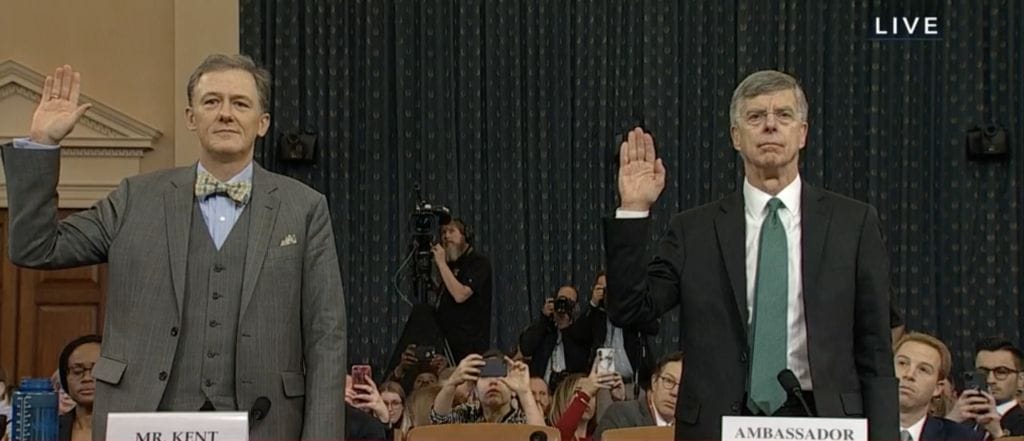
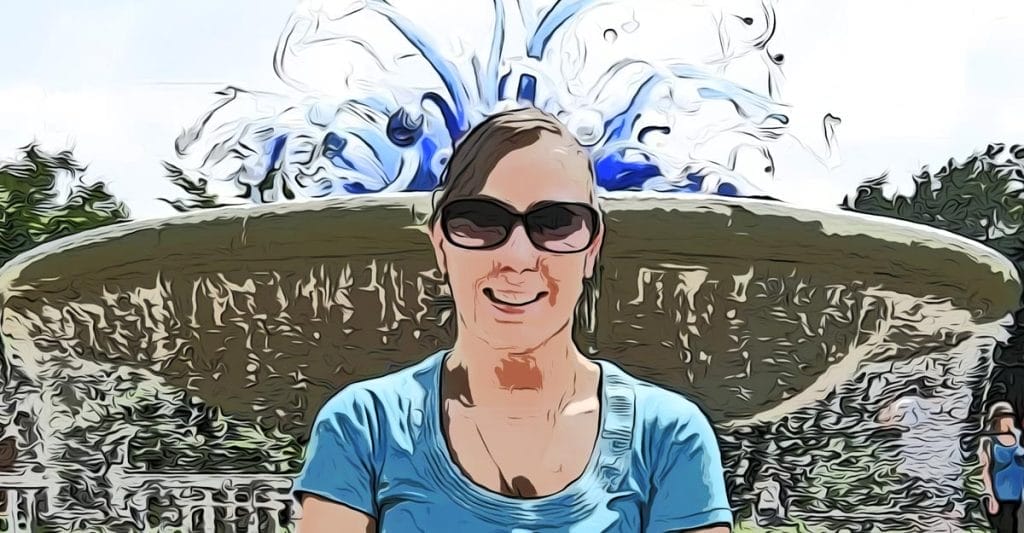
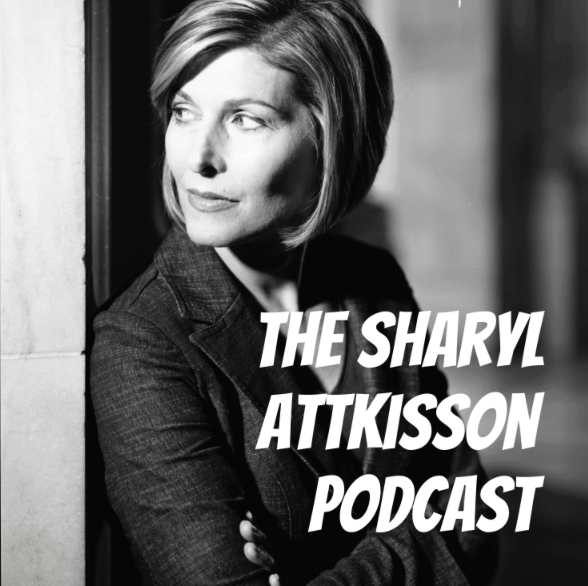

Good information but horrible editing. Somebody please hire a 6th grade English teacher to clean up all the grammar.